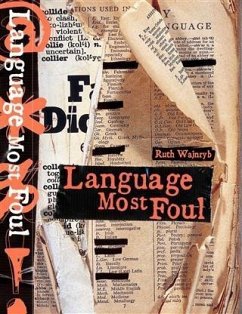Have we always sworn like troopers? Has creative cursing developed simply because we can't thump someone when they make us mad? And if verbal aggression is universal, why is it that some languages (Japanese for instance) supposedly have no offensive words? Language once reserved for the footy field---or the labour ward---has broken through the tradesman's entrance, much to the horror of a few refined individuals, but seemingly not anyone much else. Ruth Wajnryb takes an entertaining look at how this came about, and at the origins of some of our more colourful words and phrases. Stepping outside the confines of English, Wajnryb explores whether bad' words are mirrored in other languages, and the cultural differences that exist when it comes to giving offence. Why is it that in some countries you can get away with intimating that a person and their camel are more than just good friends, while pouring scorn on their mother's morals guarantees you a seat on the next flight out? An amusing and idiosyncratic look at the power of words to shock, offend, insult, amuse, exaggerate, let off steam, and communicate deep-felt emotions, Language Most Foul is a must-read for anyone who loves language---or has ever stubbed their toe. Ruth Wajnryb has gone where almost no linguist before her has dared to go This well-researched study of foul language is simply fascinating. Written with great humour, it is full of interesting history and funny anecdotes. Giving examples here is not possible without using four-letter words, so just buy the f...ing book.' The Age A classy drive through the streets and byways of swearing Wajnryb is the grammarian you always wanted: wise, wearing her erudition lightly and enlivening it with sly humour.' Kirkus Reviews
Dieser Download kann aus rechtlichen Gründen nur mit Rechnungsadresse in A, B, BG, CY, CZ, D, DK, EW, E, FIN, F, GR, HR, H, IRL, I, LT, L, LR, M, NL, PL, P, R, S, SLO, SK ausgeliefert werden.


